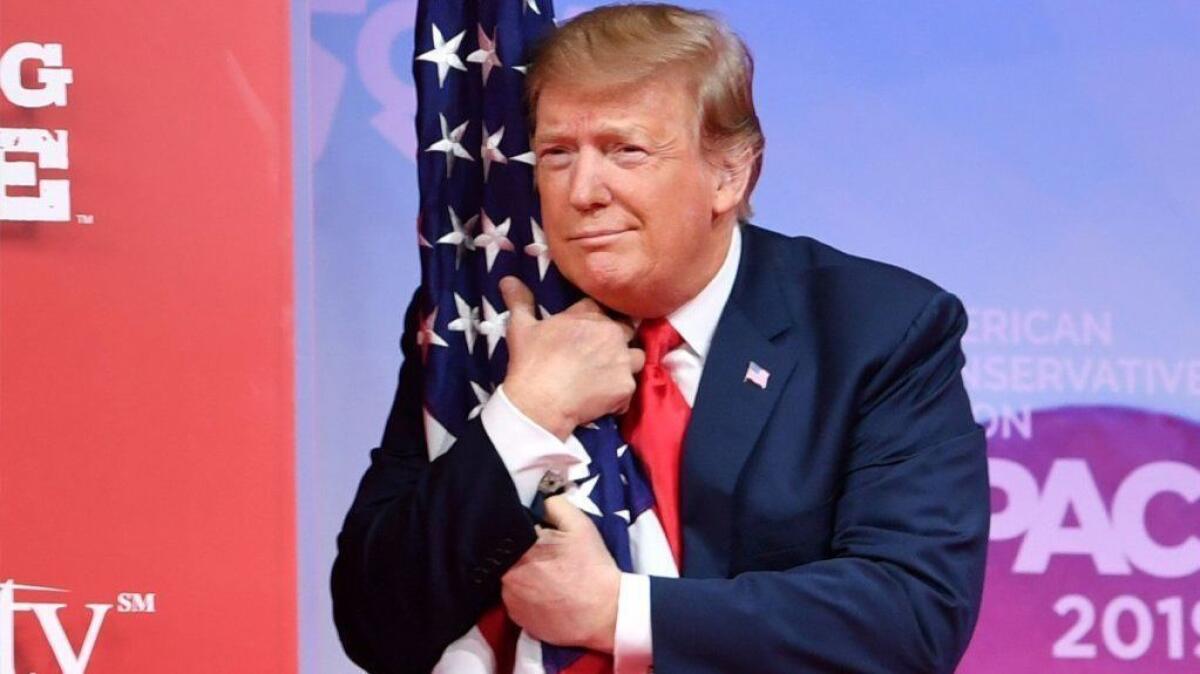Column: Flag huggers, tree huggers and other early narratives of the 2020 race

- Share via
Reporting from Washington — Every presidential campaign needs a narrative — a story the candidate tells to explain why he or she should be elected.
George W. Bush’s narrative relied on fear to win reelection in 2004, the dark days of the war on terror. Barack Obama’s call for hope and change vaulted him to the White House four years later.
In 2016, Hillary Clinton said Donald Trump was too dangerous to be president. Trump said it was time for a change — and that Clinton was “corrupt.”
Now, 11 months before the first nominating contests, the narratives of the 2020 race are taking shape. The profusion of candidates — 15 so far with more to come — are road testing their pitches as they tour Iowa, New Hampshire, South Carolina and other crucial early states.
And even if you think politics has become unmoored in the Age of Trump, most of the candidates’ appeals are actually quite traditional.
Trump wants the next election to be a referendum on the economy — and a record he sees as a list of campaign promises he kept.
“America is now booming like never before,” he told a conservative forum in a two-hour stemwinder on Saturday. That’s not quite true — growth isn’t at a record high — but it’s a normal pitch for an incumbent.
Electing a Democrat could “completely destroy the American economy” because their policies add up to “socialism,” he charged.
That’s a traditional narrative, too. Republicans have warned against creeping socialism for more than a century.
Democrats want the election to be a referendum on Trump and his norm-breaking style — because if the president’s popularity stays as low as it is now, that’s a contest he’s likely to lose.
That was one lesson of the 2018 congressional election; when the president unwisely declared that his name was on the ballot, House Republicans got drubbed. So the Democrats’ common pitch is also traditional, especially for non-incumbents: They’re for change, not more of the same.
Within that theme, Democrats have several narratives from which to choose. They all begin from the premise that Trump has taken the country in the wrong direction, but they take the story in different directions.
For Sens. Bernie Sanders of Vermont and Elizabeth Warren of Massachusetts, the narrative is much bigger than Trump. It’s about the concentration of power in what they call “the billionaire class” and a “rigged system” that props them up.
“It won’t be enough to just undo the terrible acts of this administration,” Warren said recently. “Our fight is for big, structural change.”
For Sens. Kamala Harris of California and Cory Booker of New Jersey, the central narrative — beyond the long list of policies they want to change — is about the politics of division.
“America is better than this,” Harris said, echoing Obama. “The truth is that as Americans we have much more in common than what separates us.”
“We are better when we help each other,” Booker agreed, calling for “a revival of civic grace.”
For political centrists like Sen. Amy Klobuchar of Minnesota and John Hickenlooper, the former governor of Colorado, the narrative is about restoring the lost virtues of bipartisanship and moderation.
“We need dreamers in Washington, but we also need to get things done,” Hickenlooper said when he joined the race.
Washington Gov. Jay Inslee has put all his chips on the environment, specifically climate change, which he called “the most urgent challenge of our time.” Sen. Kirsten Gillibrand of New York is touting her story as a “young mom,” vowing to fight for other people’s kids as hard as for her own.
One thing Democratic strategists don’t want is to see the general election turn into a referendum on “socialism,” the term Trump and other Republicans increasingly toss around.
Most voters broadly like the Democrats’ ideas — universal healthcare, a higher minimum wage, higher taxes on the rich. But polls suggest the word “socialist” still drives moderate voters away.
That’s produced an odd spectacle: a string of Democrats suddenly proclaiming allegiance to free market economics.
“I am a capitalist to my bones,” Warren assured voters. “I’m not a democratic socialist,” Harris said, making a clean break from Sanders and those in his corner.
It has left Sanders the only self-proclaimed socialist in the race — a label that may give him a strong base in the primaries, as it did in 2016, but leave him vulnerable to Trump later on.
As for the 2020 election, all those candidates talking about unity and healing may be onto something — as starry-eyed as their narratives might sound.
In a Washington Post/ABC News poll last year, voters ranked “reducing the divisions between people in this country” as one of their three highest concerns, after healthcare and the economy.
“A message of change can be framed several ways,” Republican strategist David Winston told me.
“It can be negative: Life is difficult, you need a change. It can be positive: We need a change so people can have better opportunities. Candidates with a positive appeal will do better in the general [election].”
Obama’s narrative in 2008, he noted, wasn’t only about change; it was about “hope and change.” If the 2020 Democrats want a lesson from their party’s past, they could do worse than that.
More to Read
Get the L.A. Times Politics newsletter
Deeply reported insights into legislation, politics and policy from Sacramento, Washington and beyond. In your inbox three times per week.
You may occasionally receive promotional content from the Los Angeles Times.











